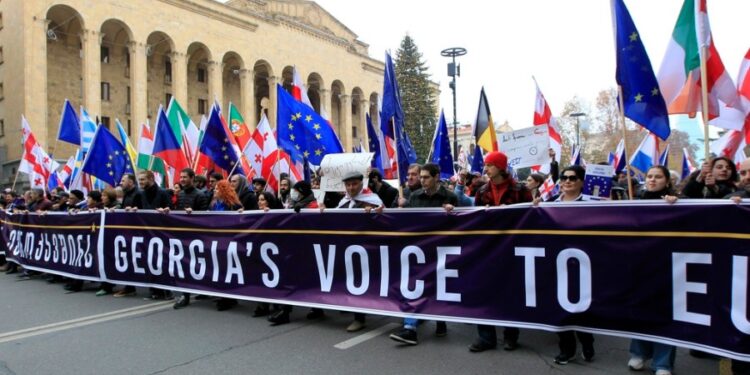
Over the last decade, we have seen democratic backsliding and autocracy on the rise around the world.
Strongman leaders from Hungary to the Philippines make pledges to restrict rights, crack down on civil society and the media. But few campaign narratives have been more brazen than that Georgia’s Dream Party, whose prime minister has promised to ban opposition parties and remove the seats of democratically elected opposition members of parliament should his party win in October.
When I moved to Georgia in 2014, it was a place of great promise. There had just been a peaceful transfer of power from the United National Movement government to a broad coalition of opposition parties. Widespread liberal democratic reforms were underway to address shortcomings in the judiciary, parliament and elections. Parliament passed non-discriminatory legislation and established a gender equality council.
The country was forcefully pushing for EU and NATO membership, even establishing a ministry to that effect. Russia, which occupies a quarter of Georgia, was clearly the enemy, whereas Europe and the U.S. were allies. Georgia was a partner in allied efforts in Afghanistan and elsewhere.
Over the next several years, however, the familiar whiffs of illiberalism appeared. As in many backsliding democracies, one of the first signs of decline are attacks on gays, women and ethnic or religious minorities.
True to this playbook, Georgia codified heterosexual marriage in its constitution (though same-sex marriage was already illegal), blackmailed women in public life through video recordings of personal lives, and removed quotas for women, with misogyny on shocking display. Narratives attacking Turks, Muslims and ethnic Azeri communities were also prevalent.
Before long, the broad coalition government crumbled, with all parties jumping ship except Georgian Dream, and democratic declines accelerated. Dream increased its attacks on civil society (calling them “enemies” and fascists), the media and all independent institutions that hold government to account, such as the office of the ombudsman. Judicial and electoral reform stalled.
The new “foreign agents” law passed this year, which mirrors Russia’s agents law, aims to destroy the few remaining checks on Georgian Dream — civil society and media — for good. It strictly curtails organizations that receive funding from the U.S. and Europe, labeling them as “foreign agents,” demanding unreasonable (and often impossible) paperwork, and threatening investigations, access to private personal information and prison sentences.
When this law was proposed, the streets of Tbilisi were filled with tens of thousands of protestors for months, with the government brutally attacking its own people.
Georgia Dream’s new law and anti-democratic measures align with, and arguably necessitate, a sharp pivot in Georgia’s foreign policy trajectory. EU and NATO membership requires reforms that could threaten the party’s grip on power.
Free and fair elections, an impartial judiciary, a robust civil society and transparent institutions could level the playing field to the point that Georgia Dream might not win. The Kremlin, on the other hand, has the party’s back when it comes to stamping out democracy. Georgia Dream and its informal ruler, oligarch Bidzina Ivanishvili, view electoral defeat, and thus democracy itself, as an existential threat.
The full-scale Russian invasion of Ukraine also helped prompt Georgia Dream to flip the script of as to who are Georgia’s friends and foes. Parroting Kremlin talking points from the start, Georgia Dream leaders placed blame on NATO and the West. They sputtered fevered nonsense about the existence of a “global war party” of Western leaders (as well as Hollywood and George Soros) that wants to drag Georgia into war. With such rhetoric, Georgia Dream has deepened the country’s ties to Russia through direct flights and sanctions-evasion.
Meanwhile, Georgia Dream continues to insult U.S. and European leaders, diplomats and organizations. The party is betting on Russia winning this war and has adopted a Vichy approach of appeasement and abandonment of its traditional allies.
Nevertheless, I was still stunned by the party’s campaign promise to eliminate opposition parties and mandates. I have lived around the world, including in many countries categorized as “not free,” but never have I heard an electoral pledge to end democracy.
Even dictators like Russia’s Vladimir Putin want to preserve a veneer of multi-party competition. There can be no clearer demonstration of Georgia’s fall.
It is not, however, a foregone conclusion. Voters go to the polls in October and can choose between a future with the West or one with Russia. They will simultaneously choose between democracy and a Belarus-style autocracy.
Given the unlevel playing field, a coopted election commission, a lack of a unified opposition, and Georgia Dream’s rampant abuse of state resources, the democracy vote will have to be overwhelming. Even then, an opposition victory could spell trouble and instability, given Russia’s pledge of support for Georgia Dream, and Georgia Dream’s likely embrace of a Maduro-style denialism.
Why does this matter to U.S. and European policymakers? Georgia is a small country, but it is on the frontlines of a broader struggle against authoritarianism and a Kremlin takeover. The Eastern frontier is fragile, comprising Moldova, Armenia, and Azerbaijan.
Hopefully, Georgia votes for freedom. But either way it is a cautionary tale. U.S. and EU policymakers must react more quickly to early warning signs. More importantly, we must go on offense to make the case for democracy to counter those who, in the words of Sen. John McCain (R-Ariz.), “turn away from universal values and toward old ties of blood and race and sectarianism; harden resentment…towards immigrants and refugees and minority groups; are unable, and even unwilling, to separate truth from lies; and flirt with authoritarianism and romanticize it as our moral equivalent.”
Laura Thornton lived 25 years overseas working for democracy-promotion organizations from Thailand and Cambodia to Georgia. She is senior director for global democracy at the McCain Institute.







